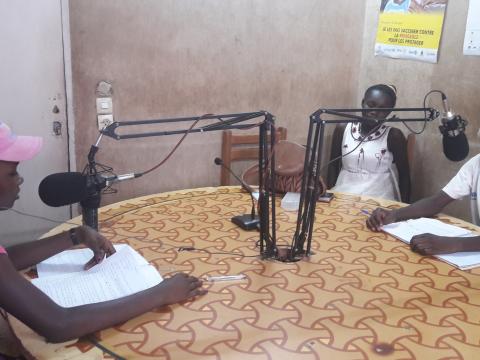DRC faces countless crises, but sees youth-led transformation among refugee communities

Key statistics:
- The DRC has the largest number of internally displaced people in Africa -5.5 million- facing risk of hunger and various epidemics
- The country is facing several crises but also hosting 527,338 refugees and asylum-seekers
- 52% of refugees and asylum-seekers in the DRC are women
- There are 912,069 Congolese refugees and asylum seekers in neighbouring countries
Amidst battling COVID-19, wrestling two Ebola Virus outbreaks, and fighting the deadliest and longest measles outbreak in its history, the DRC is home to 527,338 refugees and asylum seekers, as well as host to the largest number of internally displaced people in Africa.
“The situation in this country remains highly complex with displacements resulting from ongoing armed conflicts, in a country where 15.6 million people are severely food insecure. These displacements, not only disrupt the livelihood of families, but increase the risks to child survival and further obscures efforts to address deadly diseases like COVID-19, Ebola and measles,” says Anne-Marie Connor, World Vision’s National Director in the DRC.
“While the need is high, from our programmes reaching over 65,000 people in Ubangi, we have seen youth-led transformation, which proves that every action counts. Here we have trained and equipped young reporters from both the host as well as refugee communities to be agents of change,” Anne-Marie further explains.
To illustrate the power of transformation in line with this year’s World Refugee Day theme – ‘Everyone can make a difference. Every action Counts’ – Anne-Marie continues: “One of the youth reporters, Lydie Moninga, was 16 years old when she was rescued from an unwanted marriage. After basic training, she embraced community journalism on Radio Liberté Gbadolite to champion causes for peaceful coexistence and infection prevention and control, and also campaign against Sexual Gender-Based Violence (SGBV). Today, Lydie is furthering her studies at a university in Kinshasa, and we are seeing many girls staying longer in school,”
World Vision is working to improve the well-being of refugees, displaced persons, returning refugees and host communities by implementing WASH, food assistance, protection, livelihoods / income-generating, and skills-development programmes at various locations in the country, where these communities are also more vulnerable to COVID-19 aftershocks.
World Vision knows that humanitarian capacity is overly stretched in the face of COVID-19, the money for non-COVID-19 programming is dwindling, and families are beginning to experience aftershocks of the pandemic. Globally, in conflicts “almost half of those forced to flee are children, many of whom have little or no access to education, healthcare or protection. These children face a severe risk of being forced into child marriage, child labour, trafficking and abuse. They deserve the same rights as children in stable communities, but their rights and needs are being ignored by the international community.” says Daniela Buzducea, Partnership Leader for Advocacy & External Engagement at World Vision International
In response to UNHCR’S announcement this week that global displacement figures have almost doubled in a decade and now stand at 79.5 million, World Vision highlights the impact that this global crisis is having on children. An estimated 30 to 34 million of the world’s 79.5 million forcibly displaced are children.
“More funding is needed to urgently meet the multiple aftershocks that are affecting child survival, child development and family cohesion for a country battling disease and conflict, and that is host to the second-highest number of severely food-insecure people in the world. This support will facilitate the creation of safe environments so that more girls and boys, like Lydie, can take actions to make a difference in their communities,” Anne-Marie petitions as the world marks this year’s World Refugee Day.
ENDS
Notes to editors
For further information or to organise an interview, please contact:
Geoffrey Kalebbo Denye, Communications Specialist, World Vision DRC: geoffrey_denye@wvi.org
World Vision’s Childhood Rescue helps children in the most dangerous places to survive, recover, and build a future through critical interventions, infrastructure, experience and a dedicated global network.
World Vision is a Christian humanitarian organisation dedicated to working with children, families and their communities to reach their full potential by tackling the root causes of poverty and injustice. World Vision serves all people, regardless of religion, race, ethnicity or gender. For more information, please visit www.wvi.org or follow us on Twitter @WorldVision